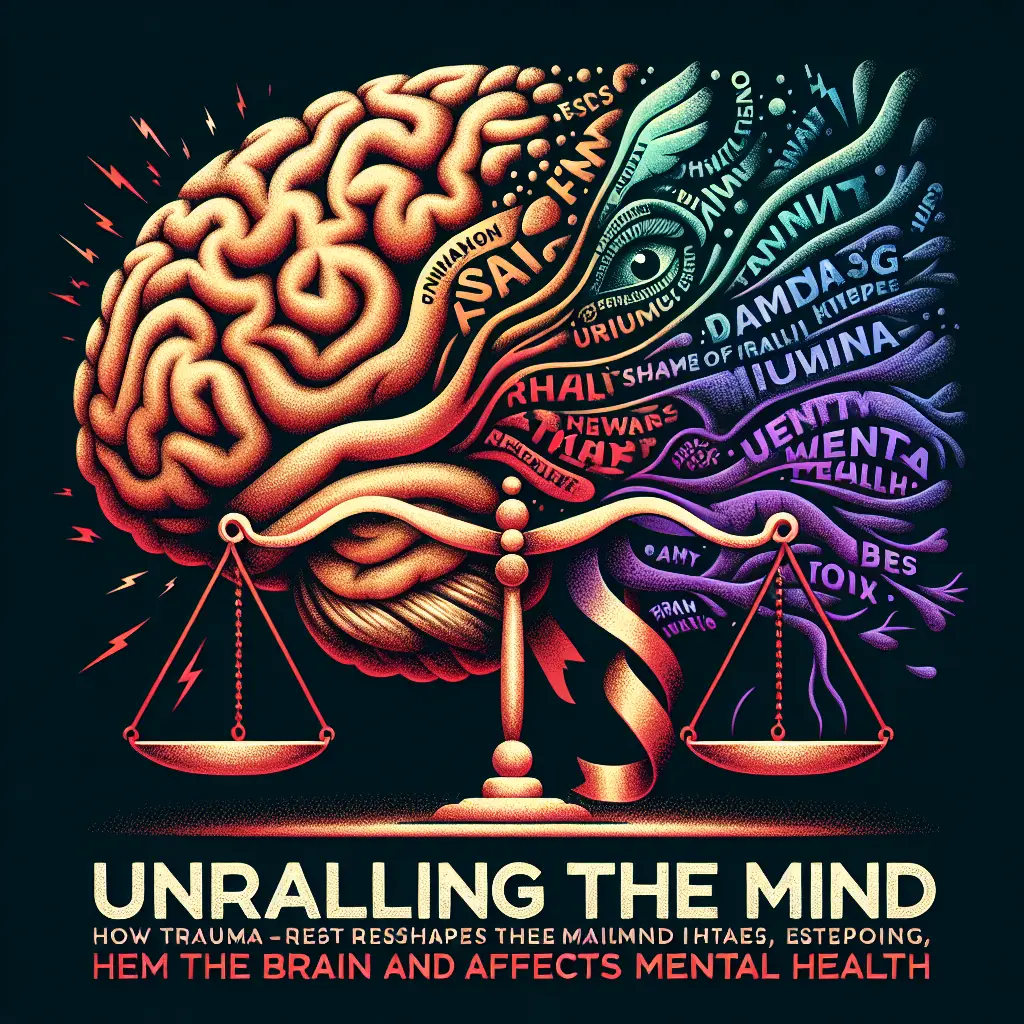
Unraveling the Mind: How Trauma Reshapes the Brain and Affects Mental Health in Profound and Profoundly Positive Ways
Introduction
In a world increasingly aware of the intricate relationship between mental health and biological function, understanding the profound impacts of trauma on the brain has never been more relevant. This article, Unraveling the Mind: How Trauma Reshapes the Brain and Affects Mental Health, delves into the intricate mechanisms by which adverse experiences shape our minds, our emotions, and our behaviors.
Trauma is not just a mental scar; it leaves an indelible mark on the brain’s structure and function. This essay will explore scientific insights about these changes, illustrated by compelling case studies, while also offering hope through actionable strategies to mitigate these effects.
The Neuroscience of Trauma: Understanding the Mechanics
What is Trauma?
Before diving into the mechanics of trauma’s impact on the brain, it’s essential to define what trauma is. Trauma refers to an event or series of events that an individual finds overwhelmingly stressful or disturbing. These can include:
- Acute Trauma: Resulting from a single incident, such as an accident or natural disaster.
- Chronic Trauma: Involving repeated exposure to distressing events, like ongoing abuse or neglect.
- Complex Trauma: Representing exposure to varied and multiple traumatic events, often of an invasive, interpersonal nature.
The Brain’s Architecture: A Brief Overview
To understand how trauma reshapes the brain, we first must familiarize ourselves with its architecture. Major components affected by trauma include:
| Brain Area | Function | Impact of Trauma |
|---|---|---|
| Amygdala | Emotion regulation; threat detection | Increased anxiety and fear responses |
| Hippocampus | Memory formation and emotional regulation | Impaired memory and learning capabilities |
| Prefrontal Cortex | Decision-making, impulse control | Poor emotional regulation and altered judgments |
| Corpus Callosum | Communication between brain hemispheres | Impaired cognitive processing |
Each of these regions suffers when exposed to traumatic experiences, leading to a cohesive understanding of how trauma manifests in mental health disorders.
Case Study 1: The Impact of Childhood Trauma on Brain Development
Background
Research has shown that childhood trauma significantly alters brain development. The Adverse Childhood Experiences (ACE) study is a landmark investigation that reveals the consequences of childhood distress.
Findings
Children who experienced trauma demonstrated notable changes in the size of the hippocampus and the functioning of the amygdala and prefrontal cortex. One compelling element from the ACE study is that those with higher ACE scores are at increased risk not only for mental health issues like PTSD and depression but a range of physical health problems later in life.
Analysis
This case underscores the importance of early intervention. Strategies like therapy and supportive environments can help mitigate these adverse impacts by promoting neuroplasticity — the brain’s ability to adapt and change.
How Trauma Affects Mental Health Disorders
The Spectrum of Disorders Linked to Trauma
Trauma is a significant contributor to various mental health disorders:
- Post-Traumatic Stress Disorder (PTSD): Characterized by reliving traumatic events, avoidance behaviors, and heightened emotional responses.
- Anxiety Disorders: Trauma can trigger or exacerbate general anxiety and panic disorders.
- Depression: Many individuals with a history of trauma report symptoms of prolonged sadness and hopelessness.
Neurobiological Mechanisms
When a person faces trauma, neurobiological changes occur, amplifying emotional distress:
- Dysregulated Stress Response: The hypothalamic-pituitary-adrenal (HPA) axis becomes overactive, leading to chronic stress responses.
- Altered Neurotransmitter Function: Trauma affects neurotransmitter systems, particularly those involving serotonin and dopamine, crucial for mood regulation.
Case Study 2: The Resilience of the Brain
Background
While trauma can have dire effects, many individuals exhibit resilience. A case study by the National Institute of Mental Health (NIMH) focuses on a group of veterans who overcame severe PTSD symptoms through a technique called Eye Movement Desensitization and Reprocessing (EMDR).
Findings
This approach helped them reprocess distressing memories, facilitating healthier emotional responses. Neuroimaging studies showed increased activity in the prefrontal cortex, suggesting improved regulation of emotions and memory.
Analysis
This emphasizes that while trauma reshapes the brain, recovery is possible. Techniques like EMDR and cognitive-behavioral therapy (CBT) show promise in fostering neuroplasticity for healing.
The Role of Neuroplasticity in Overcoming Trauma
Defining Neuroplasticity
Neuroplasticity is the brain’s remarkable ability to reorganize itself by forming new neural connections throughout life. This capacity is crucial for recovery post-trauma.
Strategies to Foster Neuroplasticity
- Mindfulness and Meditation: Practicing mindfulness can reduce stress and anxiety, fostering new pathways for emotional regulation.
- Physical Exercise: Regular physical activity promotes brain health and enhances mood.
- Therapies: Engaging in therapeutic practices such as CBT can help reframe negative thought patterns.
Case Study 3: Exercise as a Therapeutic Tool
Background
A Finnish study examined the effects of physical exercise on PTSD symptoms in survivors of trauma.
Findings
Results indicated significant reductions in PTSD symptoms among participants who engaged in regular physical activity. Neuroimaging demonstrated improvements in both the hippocampus and overall emotional well-being.
Analysis
This case illustrates that simple lifestyle changes can have profound effects on mental health. The neuroplastic potential promoted by physical activity facilitates recovery and resilience.
The Importance of Early Intervention
Understanding Timing
The earlier an individual receives support post-trauma, the better their chances for a favorable outcome. Timely intervention can prevent the initial trauma from establishing a negative cognitive pattern.
Case Study 4: School-Based Interventions
Background
A study involving school-based mental health programs for children exposed to violent environments revealed promising outcomes.
Findings
Students who participated in early interventions showed improved emotional and academic performance, suggesting that support can counteract the brain’s negative adaptations.
Analysis
School environments can serve as protective factors, demonstrating the critical nature of creating safe, supportive educational settings.
Conclusion: The Path Toward Healing and Hope
Unraveling the Mind: How Trauma Reshapes the Brain and Affects Mental Health can’t solely focus on trauma’s adverse effects; it must also spotlight the potential for resilience and recovery. Through understanding, support, and appropriate interventions, mental health professionals, educators, and families can help those affected by trauma reclaim their well-being.
Actionable Insights
Embrace practices that promote neuroplasticity, seek therapy, leverage community support, and engage in regular physical activity. Healing is a journey, and by utilizing available resources, individuals can navigate and overcome their trauma.
FAQs
1. What are the long-term effects of trauma on mental health?
Long-term effects can include depression, anxiety disorders, and PTSD, which may persist without proper support and intervention.
2. Can the brain heal from trauma?
Yes! Through neuroplasticity, the brain can reorganize itself and heal from trauma with effective interventions like therapy and lifestyle changes.
3. What is the best therapy for trauma?
The most effective therapies include EMDR, CBT, and mindfulness-based practices, tailored to individual needs.
4. How does trauma affect relationships?
Trauma can cause difficulties in trust, emotional regulation, and communication, leading to strained interpersonal relationships.
5. What preventive measures can help mitigate trauma’s effects?
Promoting open conversations about mental health, providing supportive environments, and implementing early interventions are key preventive strategies.
In summary, the journey of Unraveling the Mind: How Trauma Reshapes the Brain and Affects Mental Health leads to a clearer understanding of trauma and resilience. By acknowledging the scars of trauma, we can equip ourselves with tools that foster healing and growth.












